 Petzlover
Petzlover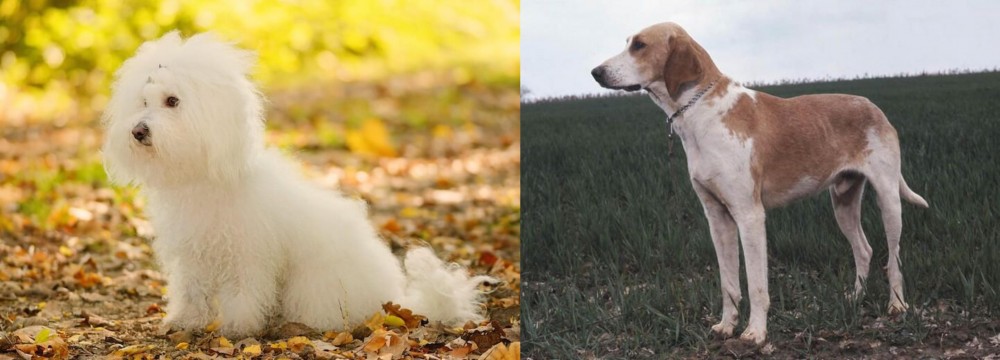 Bichon Bolognese is originated from Spain but Grand Anglo-Francais Blanc et Orange is originated from France. Bichon Bolognese may grow 66 cm / 25 inches shorter than Grand Anglo-Francais Blanc et Orange. Bichon Bolognese may weigh 6 kg / 13 pounds lesser than Grand Anglo-Francais Blanc et Orange. Bichon Bolognese may live 3 years more than Grand Anglo-Francais Blanc et Orange. Bichon Bolognese may have less litter size than Grand Anglo-Francais Blanc et Orange. Both Bichon Bolognese and Grand Anglo-Francais Blanc et Orange requires Low Maintenance.
Bichon Bolognese is originated from Spain but Grand Anglo-Francais Blanc et Orange is originated from France. Bichon Bolognese may grow 66 cm / 25 inches shorter than Grand Anglo-Francais Blanc et Orange. Bichon Bolognese may weigh 6 kg / 13 pounds lesser than Grand Anglo-Francais Blanc et Orange. Bichon Bolognese may live 3 years more than Grand Anglo-Francais Blanc et Orange. Bichon Bolognese may have less litter size than Grand Anglo-Francais Blanc et Orange. Both Bichon Bolognese and Grand Anglo-Francais Blanc et Orange requires Low Maintenance.
 The Bichon Bolognese is one of 4 types of Bichon breeds the others being the Havense, the Bichon Frise and the Maltese. The Lowchen and the Coton de Tulear are also listed in this grouping at times. The Bolognese was developed in Italy and is a small, companion animal. They are named after the city of Bologna in Northern Italy. The Bichon Bolognese is considered a toy dog and are considered an ancient breed that lived with Italian nobility. Their precise ancestry is not known and the Maltese is considered its closest relative. They have been known to exist since at least 1200.
The Bichon Bolognese is one of 4 types of Bichon breeds the others being the Havense, the Bichon Frise and the Maltese. The Lowchen and the Coton de Tulear are also listed in this grouping at times. The Bolognese was developed in Italy and is a small, companion animal. They are named after the city of Bologna in Northern Italy. The Bichon Bolognese is considered a toy dog and are considered an ancient breed that lived with Italian nobility. Their precise ancestry is not known and the Maltese is considered its closest relative. They have been known to exist since at least 1200.
The Bichon Bolognese is found in many works of art throughout the centuries. They were the favorite of many an Italian artist since the 17th century including Titian, Watteau, Gosse and Goya. They were known to be owned by Duke Frederico Gonzaga, Madame De Pompadour, Catherine the Great of Russia and Empress Maria Theresa of Austria. Cosimo de Medici gave eight Bolognese to Belgian noblemen. The Duke d’Este was given two as a gift.
Of all the Bichon group – the Bolognese is the hardest to find and the best problem solver. They read body language amazingly well, stick with their owners and are attentive and devoted. Liz Stannard brought them to England in 1990 and they were entered in the breed registry that same year and joined the show ring cycle in 2001. By 2002 they were shown at Crufts, England’s International Dog Show.
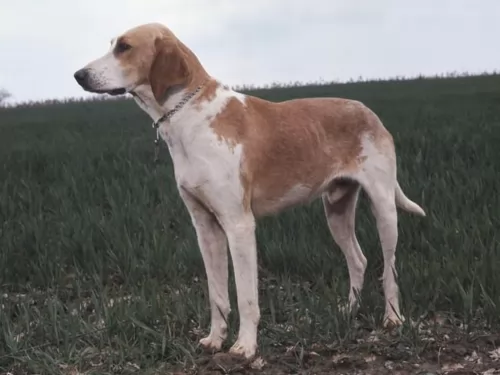 The Grand Anglo-Français Blanc et Orange is one of three Grand Anglo-Français breeds. The dogs comes from crossing French scenting hounds with English Foxhounds way back in the 19th century.
The Grand Anglo-Français Blanc et Orange is one of three Grand Anglo-Français breeds. The dogs comes from crossing French scenting hounds with English Foxhounds way back in the 19th century.
The sporting dog is rare, believing to be be pretty much confined to their country of origin – France. It is recognized in France by the French Kennel Club and also internationally by the Federation Cynologique Internationale. Since 2006, they have been recognized by the UKC and are thought to be kept essentially as a working dog as opposed to being kept as a companion dog.
 Like the other members of the Bichon group, the Bolognese is a compact, little white dog. It is considered a member of the toy group and is stocky in its build. It is a muscled, square dog of medium length with an ovoid skull and large, square, black muzzle. The jaw is well developed, and they have black lips, black nose and black eyelids. They have a straight muzzle with a strong, aligned bite and its eyes are round and wide. They have long, high set ears that hang down to a rigid base. The coat is white, long and shorter only at the muzzle. The coat is fluffy but not fringed.
Like the other members of the Bichon group, the Bolognese is a compact, little white dog. It is considered a member of the toy group and is stocky in its build. It is a muscled, square dog of medium length with an ovoid skull and large, square, black muzzle. The jaw is well developed, and they have black lips, black nose and black eyelids. They have a straight muzzle with a strong, aligned bite and its eyes are round and wide. They have long, high set ears that hang down to a rigid base. The coat is white, long and shorter only at the muzzle. The coat is fluffy but not fringed.
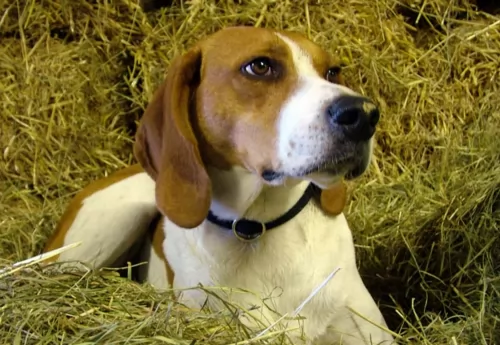 The lean, muscular Grand Anglo-Français Blanc et Orange is a large, powerful dog standing at 60 – 70cm at the withers and weighing 30 to 36 kg.
The lean, muscular Grand Anglo-Français Blanc et Orange is a large, powerful dog standing at 60 – 70cm at the withers and weighing 30 to 36 kg.
He has a short, broad head with a broad, flat skull. He has long legs, a long tail and long, floppy ears. His coat is white with orange markings. These dogs are instinctive hunters with a superb sense of smell and the ability to track their prey for miles.
Sociable, independent, loving and loyal, the Grand Anglo-Français Blanc et Orange can become attached to his owner. He doesn't want to be left alone for long periods of time, becoming bored and destructive.
Training and socialization is excellent for your dog, making him obedient and also more relaxed when you're not there.While he is patient and good with children, if you're looking for a playful pet, this dog wouldn't come as recommended for children, as his heart longs to just be outside on the hunt.
 These little white dogs with the shaggy hair are intelligent, loving, playful, loyal, and happy to do whatever you ask them to. They are more reserved than their relative the Bichon Frise. They are great at obedience training and seem to love it. They learn quickly and love to please you, yet they can also be very stubborn. Like the Bichon Frise, they are difficult to housebreak. They need to be with their people who they will develop bad habits and a bad attitude. They are bred to be companion dogs. If socialized when young they are great with strangers after you have indicated that the strangers are ok. They are barking watchdogs but not continuous barkers. They get along with other dogs but are ok by themselves as well. They do get separation anxiety when their people are gone for extended periods of time. They can be very serious and docile, but they love to be with people. They are very loyal and very bonded to their family.
These little white dogs with the shaggy hair are intelligent, loving, playful, loyal, and happy to do whatever you ask them to. They are more reserved than their relative the Bichon Frise. They are great at obedience training and seem to love it. They learn quickly and love to please you, yet they can also be very stubborn. Like the Bichon Frise, they are difficult to housebreak. They need to be with their people who they will develop bad habits and a bad attitude. They are bred to be companion dogs. If socialized when young they are great with strangers after you have indicated that the strangers are ok. They are barking watchdogs but not continuous barkers. They get along with other dogs but are ok by themselves as well. They do get separation anxiety when their people are gone for extended periods of time. They can be very serious and docile, but they love to be with people. They are very loyal and very bonded to their family.
Be sure you are the pack leader as they can acquire Small Dog Syndrome. With this syndrome the dog comes to believe he is the alpha and the humans are his pack. This causes many kinds of problems with behavior including howling when not getting attention, their separation anxiety and destructiveness can also come from this.
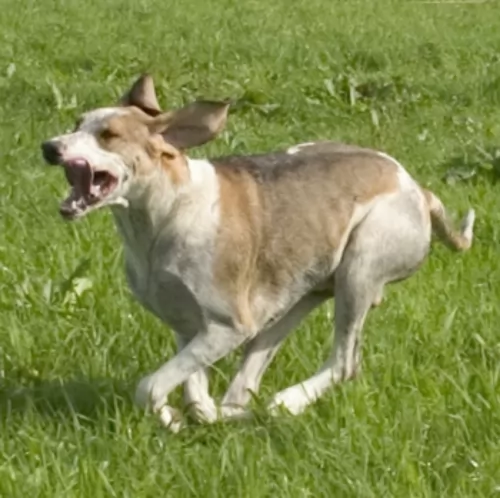 The Grand Anglo – Francais et Orange has always been a pack dog and used to being social. He will get on well with his entire human family as well as with any other pets in the home.
The Grand Anglo – Francais et Orange has always been a pack dog and used to being social. He will get on well with his entire human family as well as with any other pets in the home.
The Grand Anglo-Francais Blanc et Orange is a loyal dog, and when trained he becomes an excellent companion. He is patient with children, but doesn't make a particularly great playmate as he has a more serious personality.
The Grand Anglo-Francais Blanc et Orange is a dog that has been specifically developed to hunt, so ensure that he gets a good amount of exercise. While he is essentially a dog that loves working in a pack, he can still make his human family a loving and devoted pet.
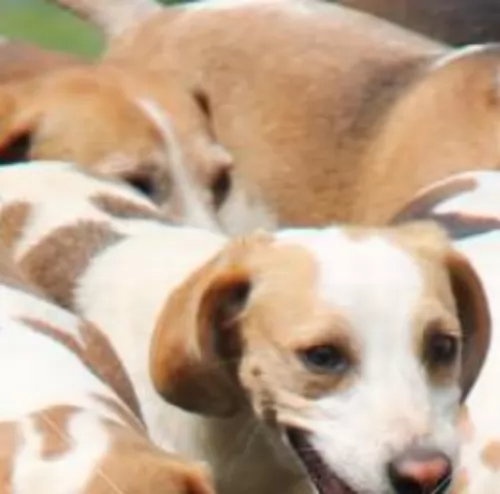 Capable of reaching 10 to 12 years in age, you won't really find any particular health issues with this dog. He is a fairly healthy dog and will be able to reach a good age with good nutrition, exercise, love and care.
Capable of reaching 10 to 12 years in age, you won't really find any particular health issues with this dog. He is a fairly healthy dog and will be able to reach a good age with good nutrition, exercise, love and care.
Because of the long, floppy ears, you want to be checking inside the ears. As a hunting scentdog, he will chase his prey through water if needs be, and damp ears can encourage bacteria.
Ear infections are common in most dogs, and you'll notice your pet scratching and rubbing at his ear and even shaking his head. You may also notice swelling or redness. Veterinary intervention will be necessary.
If your dog's ear infection has cleared up, you can maintain the health of the ear by cleaning them with a gentle cleanser and cotton wool. There is always caution when cleaning a dog’s ear, and rupturing the ear drum is one. Be careful, and if you're not sure, rather make an appointment with your vet to have his ears cleaned.
 Like other toy breeds do not overfeed the Bolognese. Feed them ¼ of a cup of high quality dry food once a day. Treats are often used for training just be judicious with them.
Like other toy breeds do not overfeed the Bolognese. Feed them ¼ of a cup of high quality dry food once a day. Treats are often used for training just be judicious with them.
They are very healthy with a propensity toward: Moving kneecaps (Luxating patella)
Legg-Calve-Perthes Disease – This causes the thigh bones to shrink due to a loss of blood supply. It can be repaired surgically.
Periodontal Disease due to their small mouth size.
They need to walk everyday but they can be couch potatoes. One long 20-minute walk will do or a couple 10-minute walks.
While Bolognese are perfectly happy to lounge around the house, they should also have a daily walk.[7] A suitable walk would be around 20–25 minute a couple of times a day or substitute 10-minute walks a few times a day. They love to play off-lead, whether its in the house or in a fenced in yard or dog park.
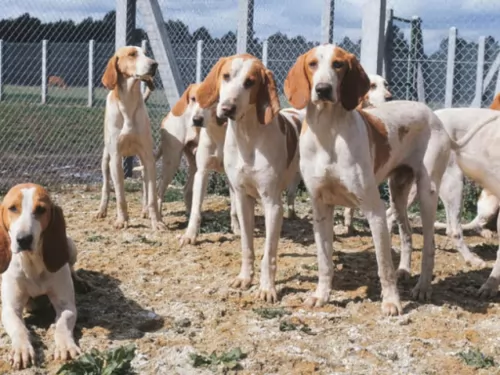 As a scenthound, your Grand Anglo-Français Blanc et Orange loves being outdoors and following a scent trail. These dogs therefore are better suited to life in the countryside as opposed to life in the city. Make sure you provide him with plenty of exercise – walks, swimming and running with you when you go cycling or jogging. Include ball- and rope games too.
As a scenthound, your Grand Anglo-Français Blanc et Orange loves being outdoors and following a scent trail. These dogs therefore are better suited to life in the countryside as opposed to life in the city. Make sure you provide him with plenty of exercise – walks, swimming and running with you when you go cycling or jogging. Include ball- and rope games too.
Your orange and white scent dog will thrive on you taking time out for him to brush his short coat twice a week and to also check for fleas and ticks at the same time.
Looking forward to his food, your energetic Grand Anglo-Français Blanc et Orange will require a high quality commercially manufactured food. Make sure that you buy the best brands to ensure your pet gets his vitamins and minerals in instead of just a lot of fillers, colorants and preservatives.
Many dog owners prefer giving their dogs several smaller meals throughout the day as opposed to one or two large meals. With his dry kibble you can add in some raw meat from time to time as well as cooked brown rice, cooked chicken and vegetables. See that he has access to a constant supply of fresh, cool water.